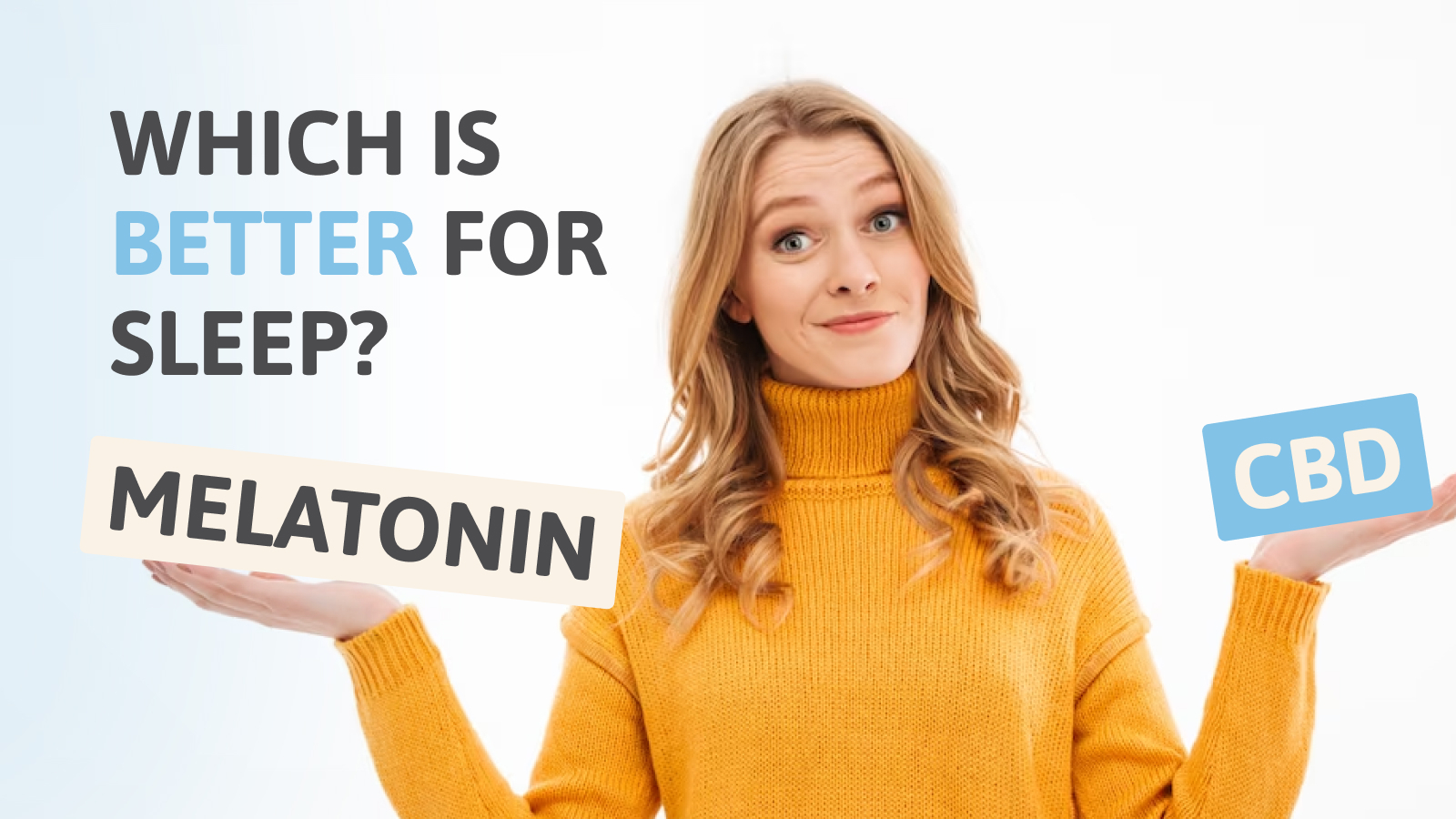
If you’ve been looking for supplements that you can take to help with sleep, you’ve likely come across melatonin and CBD. If you’re curious about whether melatonin or CBD is better for sleep, you’ve come to the right place. First, let’s make sure you know exactly what melatonin and CBD are, and then we’ll take a look at how each impacts your sleep, and which may be better.
What Is Melatonin?
Melatonin is a hormone that your body produces that helps you fall asleep. Usually, melatonin production starts towards the end of the day when it gets dark. Since melatonin is a key component to falling asleep, many people take melatonin supplements at night to help encourage falling asleep.
What is CBD?
CBD (which is short for cannabidiol) is a cannabinoid that is found in cannabis (and in especially high concentrations in hemp). Hemp and CBD are widely available and legal in most countries, and CBD products are often used to help manage anxiety, chronic pain, and yes, even sleep.
Why People Choose Melatonin to Help Sleep
There’s several reasons why people choose to try melatonin to see if it helps them sleep. First, there’s a decent body of research suggesting that melatonin has a positive impact on the quality of sleep you get. It’s a supplement that has become popular because, for many people, it really does help them get better sleep.
Another reason melatonin is popular is because it’s very, very safe. In studies examining what the lethal levels of melatonin would be, researchers couldn’t find a lethal dose in animals, which means it may be impossible to cause real physical harm to yourself by taking too much melatonin.
Finally, melatonin has very mild side-effects. In fact, many adults won’t feel any side-effects at all, which means it’s easy for most people to at least try melatonin. The fact that it’s safe, with mild-side effects, and has research-supported benefits, means that melatonin continues to be a popular choice as a potential sleep aid.
Why Shouldn’t I Take Melatonin?
If you find yourself taking high doses of melatonin, or extended-release versions of melatonin, you may experience day-time sleepiness (even if you take it at night). That could be a big problem, especially if it causes excessive napping, which can impact your ability to fall asleep and stay asleep at night.
Additionally, melatonin only helps prompt your sleep cycle. It won’t address other underlying concerns that may impact your ability to sleep (like anxiety, stress, or pain). If you’re struggling to sleep because of racing thoughts, general stress, strong anxiety, or persistent pain, then melatonin won’t do much in helping you find relief.
How Can I Take Melatonin?
Melatonin comes in multiple forms, so you have a few choices in how you could use melatonin:
- Capsules: Melatonin can come in capsules, which you would swallow like any other pill. It’s a good option if you don’t like strong flavors, or if you don’t like gummies.
- Liquid: Liquid melatonin can be an easy way to get larger doses of melatonin quickly, though it may have a strong flavor that isn’t appealing to some customers.
- Gummies: Gummies are a popular choice for melatonin, since it’s easy to chew and swallow, come in palatable flavors, and are easy to dose.
Why People Choose CBD to Help Sleep
So, why do people choose to take CBD to help improve their sleep? It’s a lot of the same reasons that people try melatonin. There is research to suggest that CBD can help with sleep issues, like insomnia, and if you’re struggling to sleep because of issues like anxiety or pain, CBD may offer relief.
Also like melatonin, CBD is very safe to use. While the Food Standards Agency (FSA) recommends no more than 70mg of CBD a day (unless under the care of a physician), research has shown that humans can safely take daily doses of CBD of up to 1500mg.
Finally, also like melatonin, CBD is very well tolerated. Many people who use CBD will never experience any side-effects, and for the ones that do, they tend to be extremely mild. That means, for most people, it’s worth trying CBD to see if it helps with sleep issues. It’s important to make sure you use CBD correctly for best results.
Also, you should be sure to talk to your doctor before trying CBD. It can interact with certain medications, so it’s always best to make sure it’s safe for you to try.
Why Shouldn’t I Take CBD?
The biggest reason you shouldn’t take CBD is if your doctor tells you that you shouldn’t. Certain kinds of prescription medication will interact with CBD, but your doctor can tell you for sure whether or not you can take it. The vast majority of people are able to safely take CBD, but it’s always best to make sure by talking to your doctor.
Another reason not to take CBD is if you struggle to tolerate the side-effects. Fortunately, even for the few people that experience negative side-effects of CBD, they tend to go away after your body adjusts to the presence of CBD.
Aside from those two factors, there aren’t a lot of reasons not to try CBD if you’re struggling to sleep, especially if things like anxiety or pain are the reasons you don’t sleep well. The research we’ve shared talks about how CBD can help directly with sleep, directly with anxiety, and directly with pain, which is one of the reasons CBD has become popular and has stayed popular as a sleep aid.
How Can I Take CBD?
Just like melatonin, CBD comes in several different forms that some consumers may prefer over others:
- Patches: CBD can come in the form of transdermal patches, which are placed on the skin and deliver CBD into your bloodstream. They have high levels of bioavailability, and are convenient and discreet to use (though it can take up to an hour for them to take effect).
- Capsules: CBD can also come in capsules, which you swallow just like pills. These are quick, discreet ways to take CBD, but since it goes through your digestive system, the levels of bioavailability are quite low (unless you use capsules specifically designed for maximum absorption).
- Inhaled forms: CBD can be inhaled (usually through vaporizers), which makes for quick, easy dosing. Since it’s inhaled, the CBD will quickly make it into your bloodstream with decent bioavailability levels. However, inhaling CBD makes it harder to dose, and not all places allow vaping, which can make it difficult to take when you need.
- Oils: CBD can also come in oils, where a dropper is used to administer oil under the tongue. It’s easier to cater your dose (assuming your dropper has measurements), but the bioavailability of oil is very low (estimates set it around 6%) compared to the previously mentioned forms of CBD.. The strong taste of oil often isn’t palatable for customers.
Should You Take Melatonin or CBD?
There isn’t an objective answer to whether you should take melatonin or CBD to help you sleep. It may be as simple as choosing melatonin if you don’t tolerate CBD well, or choosing CBD if you don’t tolerate melatonin well. If you get positive effects from both, then you may want to consider taking both to help you sleep.
When you talk to your doctor to make sure you can take CBD, you may find that you have a prescription medication that will interact with CBD, meaning you should take CBD. That may be another reason for you to try melatonin (though only your doctor can give a definitive answer on whether you can safely take CBD).
Melatonin vs. CBD Summary
Whether you try melatonin, CBD, or both, will be up to you and your personal needs. Both have research backed benefits, both are safe to use, and both have very mild side-effects (if you feel any at all). If you try melatonin, you’ll need to watch out for daytime sleepiness, which is more common with higher doses or extended release formulas.
If you try CBD, make sure to touch base with your doctor first. However, unlike melatonin, CBD is less likely to cause daytime sleepiness, treats other conditions that may be affecting your sleep, and its side-effects usually go away over consistent use.
If you decide you’d like to try CBD for sleep, we’d love to help you! You can contact us, and we can offer guidance on which form of CBD (or even which formula) might be the best fit for your needs. If you already have an idea of what you want, you can go straight to our online store and begin shopping for what seems to be the best fit.
Let us know if you have any questions or concerns about CBD for sleep, and thanks for reading!
